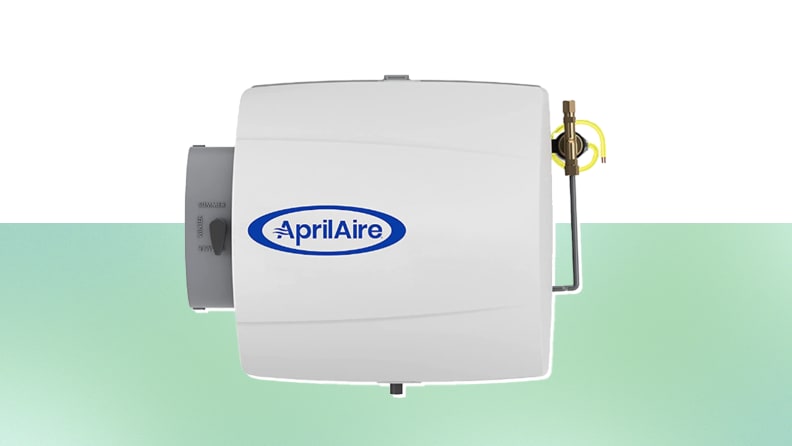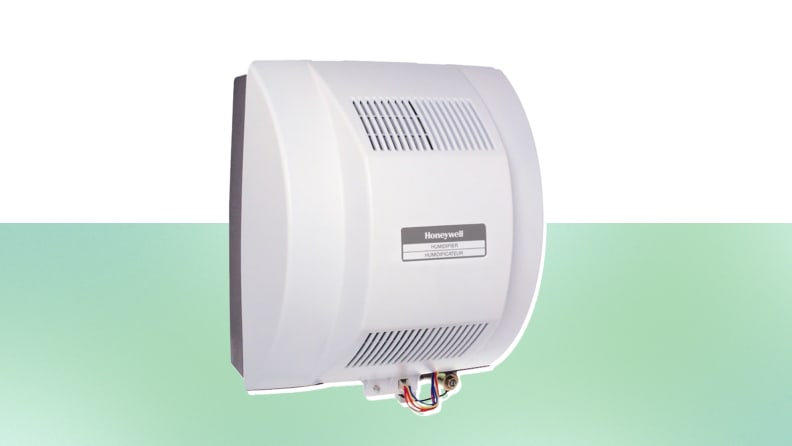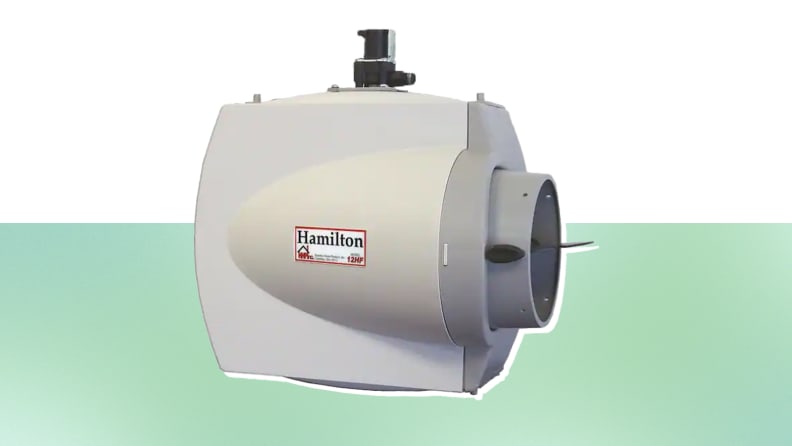Is a whole home humidifier the cure for dry, indoor air?
It’s time to up the moisture levels in your home
Products are chosen independently by our editors. Purchases made through our links may earn us a commission.
Cooler temperatures bring more than just snuggly blankets and cozy days indoors. They also bring with them a blast of dry air. Itchy skin, static electricity shocks, and a scratchy feeling in your throat are common occurrences when the air is dry, but it doesn’t have to be that way if your home has a whole home humidifier.
Designed to protect your house, health, and comfort, whole home humidifiers are more popular than ever, but why do you need one? And is it something that you can install yourself? The answer to these questions might surprise you and not knowing them might actually be making your family sick.
Here’s what you need to know about whole home humidifiers.
What is a whole home humidifier?
A whole home humidifier is very much what it sounds like: a humidifier that helps to humidify your whole home. Unlike the smaller, portable humidifiers that you may have plugged in next to your bed when you had a cold or used in your child’s nursery when they were a baby, a whole home humidifier connects directly to your home’s HVAC system.
Once connected, air from your furnace runs through the humidifier joining with water from the unit. The water transforms into tiny droplets, aka humidity, and is dispersed into the ductwork and comes out the vents to help keep your home's moisture level right where it should be during the dry winter months.
The best whole home humidifiers you can buy online
If you’re ready to protect your home and family from damaging dry air, you’ll be happy to know that you don’t need to spend hours wandering the aisles of your local hardware store, because more people than ever are buying whole home humidifiers online.
1. Aprilaire 500 Automatic Compact Whole Home Humidifier

This compact humidifier provides up to 3600 square feet of full coverage for your home, no matter if your space is big or small.
The appropriately named Aprilaire 500 Automatic Compact Whole Home Humidifier is a favorite with Amazon shoppers. The Aprilaire model can provide humidity to 3,600 square feet of living space. Compact and utilizing a digital control to manage and maintain your home’s humidity level, reviewers claim that it is “life changing” while exclaiming “I can breathe!”
2. Honeywell Whole House Humidifier Whole House Evaporative Humidifier

With easy install, this Honeywell humidifier can mount directly onto your furnace.
Honeywell, a big name in the humidifier game offers the Honeywell Whole House Humidifier Whole House Evaporative Humidifier. Covering up to 4,500 sq ft, like the Aprilaire this model automatically turns itself on and off to maintain your desired humidity level. Available at Lowe’s, reviewers call it “the best humidifier I’ve ever owned” and rave about how quiet it is while running.
3. Whole House Furnace Mount Flow Through Humidifier by Hamilton

The Hamilton Whole House Humidifier uses 80% less water, which can improve your home's air quality and water and sewage bills.
Claiming to use up to 80% less water than other whole home humidifiers on the market, is the Whole House Furnace Mount Flow Through Humidifier by Hamilton. Available at Home Depot this model covers 3,000 square feet. Reviewers love that it’s easy to install, stating “I am 100% satisfied” and “it exceeds my expectations.”
Why do you need a whole home humidifier?
There are quite a few reasons why your house needs a whole home humidifier and it might surprise you that aside from some pretty compelling health benefits, having a whole home humidifier can actually save you money.
It helps reduce viruses in your home
Viruses thrive in dry air, which is a big reason why colds tend to tick up in cooler temperatures. Thriving in low levels of humidity, airborne virus particles such as the influenza virus can live longer and move further through dry air, potentially infecting more people.
But in humid environments, those same viruses die quicker and infect less people, which is why having a whole home humidifier in your house can actually help protect your family from getting sick.
It helps boost your immune system
It doesn’t matter how many vitamins you take, your body’s first line of defense from getting sick is keeping germs from entering it, which is why your throat and nose are lined with mucosa.
Filled with germ fighting cells that help to kill off bacteria and viruses that are trying to sneak their way in, these same mucosal-dwelling, germ fighting cells dry out and die in low levels of humidity, which is why it’s important to keep your home humid.
It protects your home and belongings
When there’s not enough moisture in the air, the wooden beams of your home’s frame can dry out and split, which may cause structural problems. In an event like this, the seals that keep your pipes from leaking could fail and you can get gaps around the windows and cabinets where dried out building materials have pulled away from each other.
It's not just your house that you need to worry about in dry air because everything starts to decay when there’s no moisture in the air (and your belongings are no exception). Without moisture clothing and upholstery can shred or tear, the paint on your furniture can peel and chip, book pages can thin out, and even your dishes are more likely to crack if accidentally bumped.
Sounds expensive doesn’t it? Well, it is, which is why keeping an appropriate level of humidity in your home can save you a ton of money in repairs and replacements.
Your warranty might require it
Humidity is so essential to protecting your home and the contents within it, that some warranties such as a flooring or cabinet warranty, may actually lapse if you don’t keep your home’s humidity levels within a certain range.
I learned this recently when my new wood flooring began to crack and after filing a warranty claim, a flooring representative showed up to test the moisture levels in my home.
It can help cut down on dust
Dust is the byproduct of things that have dried out, traveled through the air, and landed on a surface. From your clothing, to your carpet, to the dirt outside, and even your skin, dust is the garbage remnants of everything around you, and when everything around you is dried out, you’re going to have more dust.
You’ll have better looking skin and hair
Although it may be hard to believe, your body is made of roughly 60% water, and although much of that water comes from what we drink, a decent amount also comes from the air around us.
As our skin and hair begin to dry out, fine lines and wrinkles become more apparent, and although I hate to break it to you, hair dye washes out faster when our hair becomes too dry to hold in the color. I bet you never knew that having a whole home humidifier would be so essential to your beauty routine, but it is!
It increases comfort levels at home
Have you ever found yourself bracing before flipping on a light switch or even giving your child a kiss on the head, because you just knew that you were about to get an electric shock? If so, then you know what it’s like to live in a home that is lacking in humidity, but it doesn’t have to be that way.
The EPA recommends keeping the indoor relative humidity levels between 30% and 50%, and below 6% to avoid mold growth and other moisture issues.
With a whole home humidifier you can shuffle your feet across the carpet all day long without a care in the world, while saying good-bye to static electricity, itchy skin, and a dry throat.
It may help stop, or down down on, snoring
Dry air can irritate and inflame your throat and sinus passages and when that happens the swelling can cause us to snore. But adding just enough humidity back into the air can calm your angry tissues, help you get you back to sleep, and prevent your bed partner from needing to sleep on the couch.
Can you install a whole home humidifier yourself?
The short answer is “yes,” although you do need to have a few handyman skills to do so because you will need to be comfortable connecting the wiring, running the water line, and tapping into your home’s HVAC system.
It’s not impossible and you can find a lot of really helpful tutorials online, but if you think it might be a bit over your skill set level, don’t panic because it’s not too costly to have a professional install the system for you. It ranges in cost from just $100 to $300 in most areas, and you’ll want to get a few quotes before handing over your credit card.
The product experts at Reviewed have all your shopping needs covered. Follow Reviewed on Facebook, Twitter, Instagram, TikTok or Flipboard for the latest deals, product reviews, and more.
Prices were accurate at the time this article was published but may change over time.


